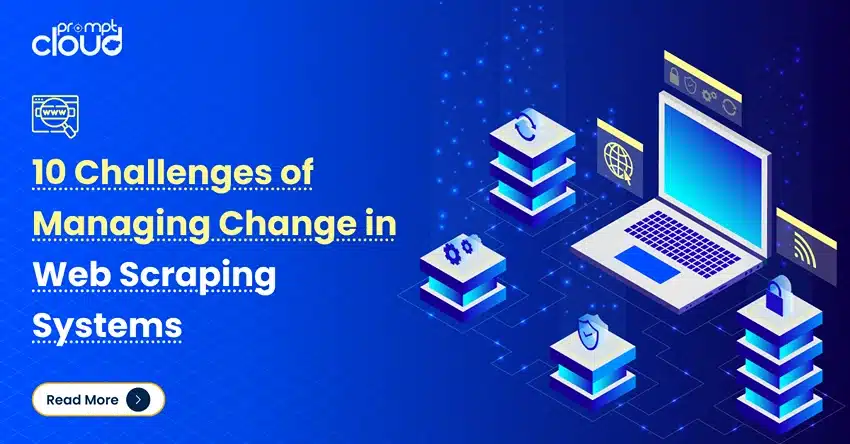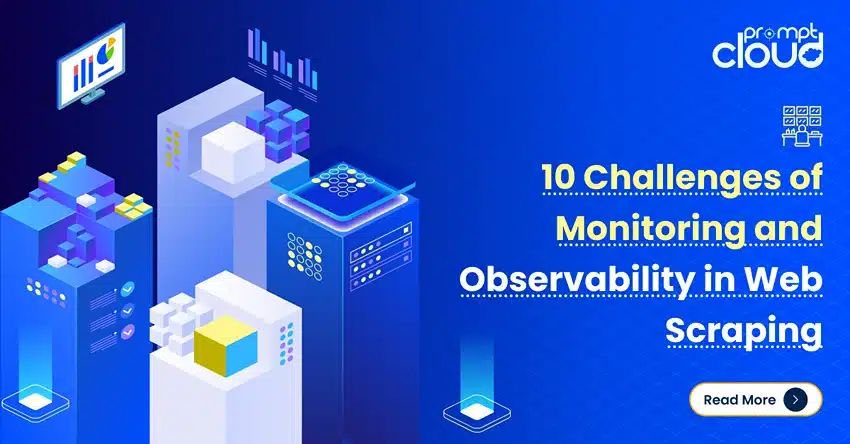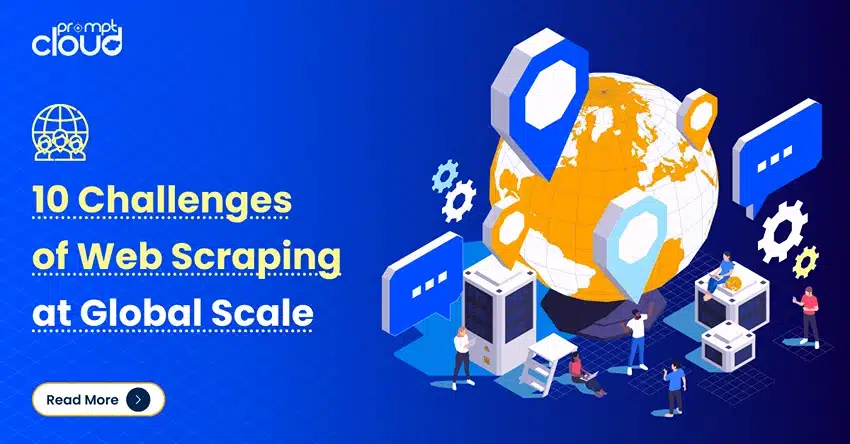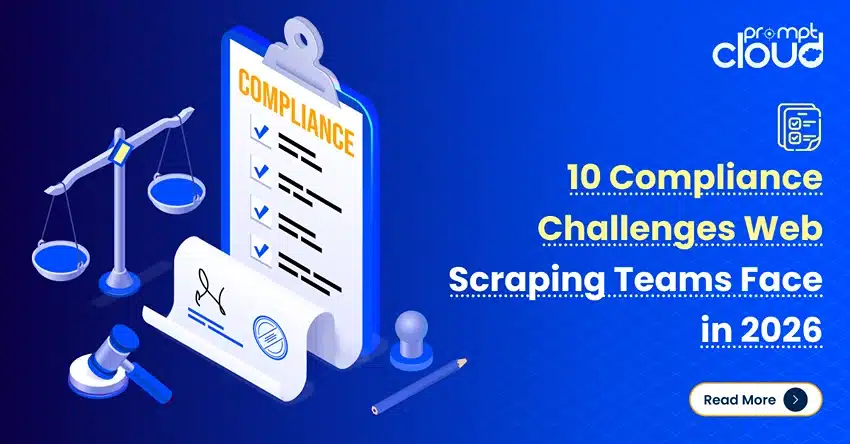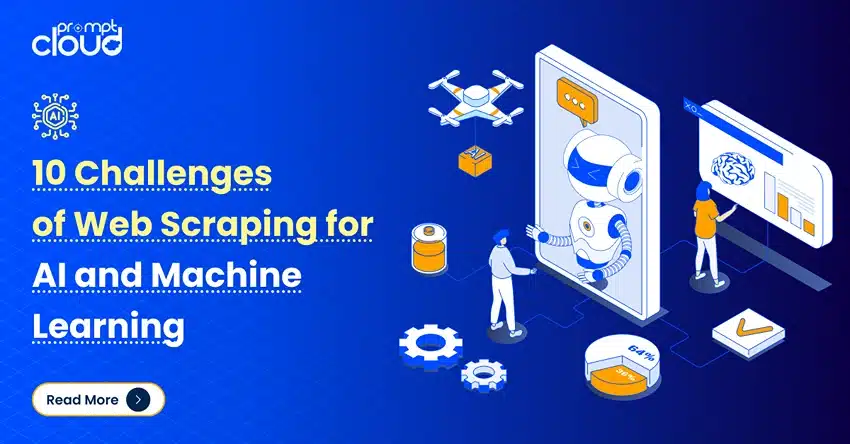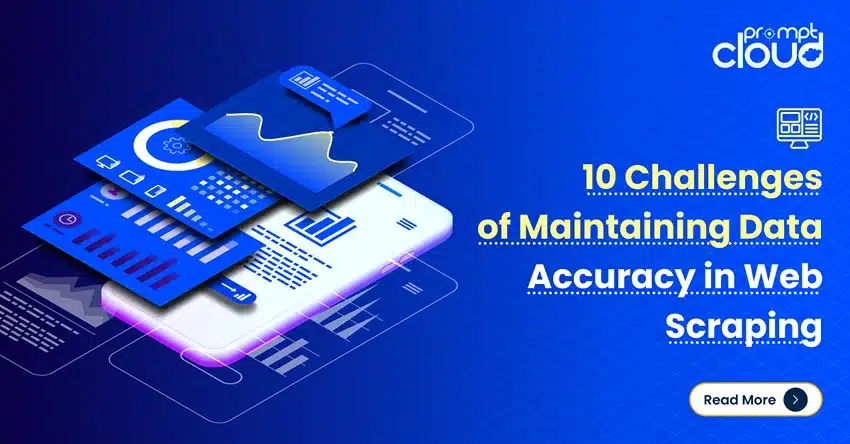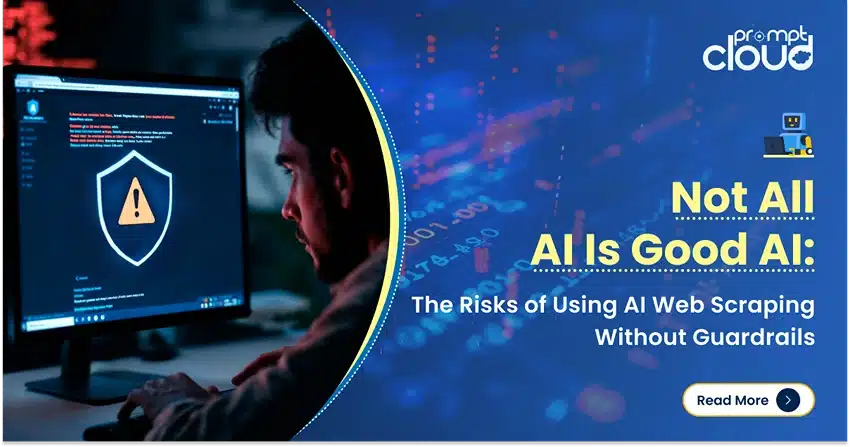
**TL;DR**
Yeah, AI is everywhere now. And sure, it can help you scrape websites faster. But faster doesn’t always mean better. When AI scrapers run without human oversight, the risks stack up fast: made-up data, broken logic, accidental scraping of stuff you really shouldn’t touch. Worst case? You’re in legal trouble before you even realize what went wrong.
The problem isn’t AI itself, it’s the way people use it. Too many teams are rushing in, trusting black-box tools to handle complex data jobs, and hoping for the best. Spoiler: That doesn’t end well.
This is why companies serious about data rely on a reputable web scraping service provider, someone who understands the legal boundaries. Someone who doesn’t just pull everything in sight, but curates data that makes sense for your business. Someone like PromptCloud. Because when you’re betting on data, you don’t want guesswork. You want it done right.
Why We Need to Talk About AI Scraping
AI scraping is all over the place right now; everyone’s talking about it. Whether you’re running a fast-moving startup or handling ops at a larger company, chances are, someone’s already pitched you an AI-driven scraping tool that promises to handle “all your data problems.”
And sure, it sounds tempting.
Why wouldn’t you want something that can collect data at scale, around the clock, and supposedly adjust to any website in real time?
The problem is that pitch leaves out some very real issues.
Not all of these tools are built with the kind of guardrails businesses need. Some scrape everything, whether or not it’s useful. Some collect data they shouldn’t. And a lot of them hallucinate, which means the tool just… makes things up.
You don’t find out until that data starts messing with your dashboards, or a client spots something wrong before you do. Or worse, until your legal team gets a message you didn’t want them to see.
That’s the risk with AI scraping: speed without oversight. It’s the reason so many companies are turning back to professional scraping services, web scraping service providers that know how to keep you out of trouble while still giving you the data you need.
The Rise of AI Scraping: Convenience or Catastrophe?
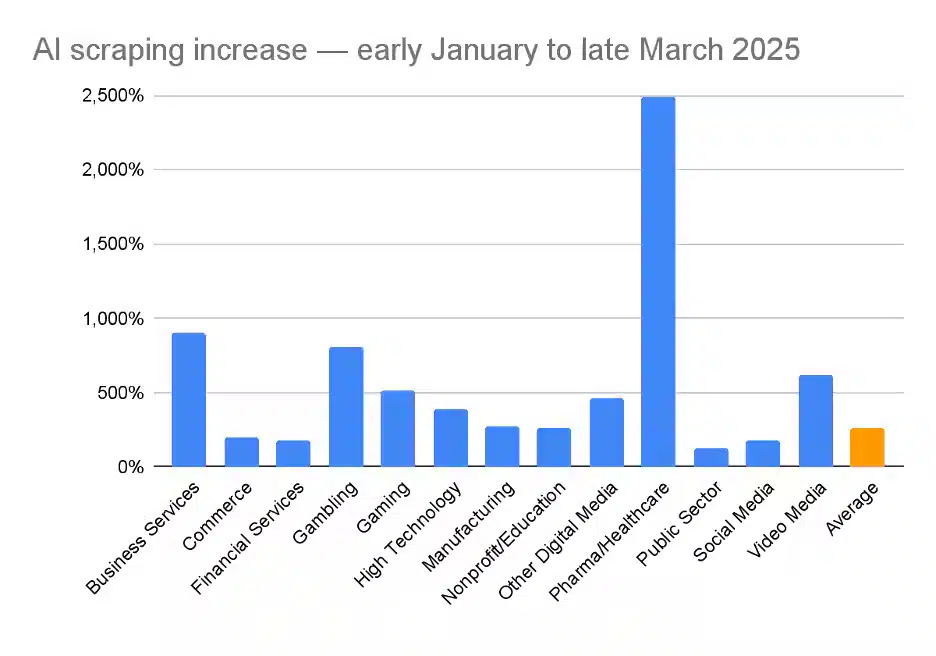
Image Source: akamai
What Is AI Scraping?
Let’s break it down. AI scraping is just what it sounds like: using artificial intelligence to extract data from websites. On paper, it sounds like a dream: faster scraping, less manual setup, and the ability to handle massive volumes of data at once. And to be fair, AI scraping tools have their strengths. They can adapt to certain site structures, learn patterns, and automate parts of the scraping process that used to require human intervention.
But here’s the problem: many of these tools operate in a black box. You feed them a URL, hit go, and out comes a dataset. What’s missing? Context, quality checks, and any real understanding of why the data matters. AI scraping often assumes that everything it sees is worth grabbing, and that’s where things can go sideways.
A tool might scrape a full webpage, including ads, disclaimers, unrelated links, or even out-of-date content, and dump it all into your database without any filter. That’s not just messy, it’s dangerous when you’re using that data to make business decisions.
Why Businesses Are Rushing Into It
There’s no denying it: AI is trendy right now. Everyone wants to say they’re using it. C-suites love the pitch of “AI-powered insights” and “fully automated data collection.” It sounds futuristic, efficient, and impressive. But many businesses adopting AI web scraping aren’t doing it for the right reasons. They’re doing it because they think it’s cheaper and faster, not because they’ve weighed the risks.
In reality, most off-the-shelf AI scraping tools don’t come with support, transparency, or flexibility. And when something breaks, which it will, they often don’t offer a way to fix it that makes sense for your business. You’re stuck either reworking everything yourself or living with bad data.
And while startups and small teams may be drawn in by the DIY scraping promise, larger organizations often discover that the moment you scale, AI scraping without structure starts to fall apart. You need monitoring, data cleaning, and compliance checks, all of which generic scraping bots don’t do well.
That’s why many companies are turning to managed solutions and professional web scraping service providers. Because while AI is great at speeding things up, it still needs guardrails. Without them, you’re not saving time; you’re creating more problems down the line.
The Real Risks of Using AI Web Scraping Without Guardrails
AI scraping without limits sounds bold. Maybe even efficient. But if you peel back the shiny surface, you’ll find a lot of cracks, some small, others costly enough to derail entire projects. It’s easy to assume the AI scraper will just “figure it out,” but that kind of thinking can land businesses in trouble fast.
Let’s look at a few of the major risks hiding behind the convenience.
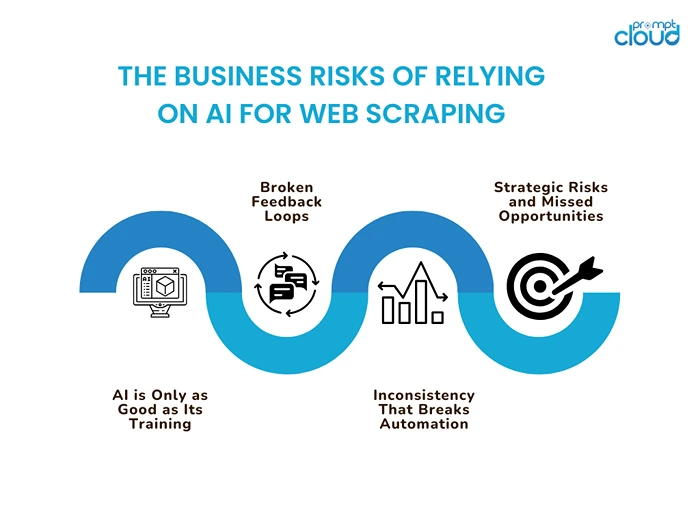
Hallucinated or Inaccurate Data
AI scraping tools don’t truly “read” web pages like a human would. They’re trained to recognize patterns, but not meaning. That means they often guess or, worse, fabricate information when something doesn’t quite fit their training. This is what’s often referred to as hallucinated data, and it’s not just an edge case. It happens more often than most people think.
Imagine pulling product listings from an e-commerce site and getting prices that never existed. Or collecting news headlines that are a mash-up of unrelated stories. Now imagine making business decisions based on that.
Without a web scraping service provider who knows how to spot and filter out this kind of noise, you risk feeding your team junk data dressed up to look legit.
Violating Website Terms & Legal Trouble
Here’s where things get dicey. A lot of AI scraping tools don’t stop to check if a website allows scraping. They just go in, take what they want, and move on. That’s not just reckless, it can be illegal depending on the jurisdiction and the type of data involved.
Many websites have explicit rules in their robots.txt files or terms of service that restrict automated access. AI web scraping tools, especially the plug-and-play kind, often ignore these. The risk? Legal action, takedown notices, or worse, data-related compliance violations that can trigger heavy fines if you’re operating in regulated markets like healthcare, finance, or the EU.
A managed web scraping service provider like PromptCloud builds scraping workflows that respect site terms, use compliance-safe infrastructure, and actively monitor for changes in site policy. You’re not just protected, you’re future-proofed.
Getting Your IP Banned or Blacklisted
Most websites monitor for unusual traffic. If an AI scraping tool hits too hard or too fast, or repeatedly triggers anti-bot measures, it can get your IP address blocked. And if you’re using shared servers, you’re not just taking down one scraper; you could take down your entire team’s access.
Once you’re blacklisted, getting unbanned isn’t easy. Some platforms keep track for weeks, others permanently. And here’s the part that stings: most AI scraping tools don’t give you a heads-up. You might not even know you’ve been blocked until you notice missing data or worse, a flatline in your dashboards.
Professional web scraping services use rotating IPs, intelligent throttling, and detection-aware strategies that adapt to each site’s tolerance. That means fewer bans, fewer gaps, and far more reliable data streams.
AI Faces Scrutiny Over Web Scraping, And For Good Reason
You’ve probably seen the headlines. “AI scrapes the web and breaks the rules.” Or maybe you heard about a major tech company facing legal pushback after using web data without permission. This isn’t just media hype; there’s a real conversation happening right now around how AI is reshaping the way businesses extract and use data, and not all of it is positive.
When AI Scraping Crosses the Line
In the rush to automate everything, a lot of companies have started cutting corners. They install a plug-and-play AI scraping tool, feed it a few URLs, and expect clean, structured data in return. What they get instead is often far from usable, and sometimes, outright dangerous.
In some cases, AI scrapers have pulled in user-generated content that was protected, confidential, or copyrighted. In others, they’ve scraped internal tools that were never meant to be public in the first place. Platforms like Reddit, Twitter (now X), and LinkedIn have all pushed back on this behavior, updating their policies and tightening access. Why? Because uncontrolled scraping, especially by AI, doesn’t just harvest content, it disrupts ecosystems.
Real-World Backlash Is Already Happening
In early 2024, several AI startups faced legal challenges for training their models on scraped web data without consent. One high-profile case involved scraping copyrighted material to train a generative AI tool. The fallout? A lawsuit, investor uncertainty, and public backlash that’s still playing out.
This kind of scrutiny isn’t slowing down. Governments, regulators, and watchdogs are now asking tougher questions: Where is the data coming from? Was it collected ethically? Was consent given? These aren’t small technicalities; they’re core issues that will shape how AI and data extraction are allowed to evolve.
If your business is using AI scraping without any kind of oversight or legal safety net, you might already be sitting on a compliance risk without knowing it.
Why It Matters More Than You Think
It’s tempting to think these issues only affect big tech firms. But that’s not true anymore. Smaller companies using AI scraping tools—especially third-party or free versions—are just as exposed. Many don’t even realize they’re violating site policies or brushing up against data laws until it’s too late.
Here’s what happens when you’re caught off-guard:
- Data pipelines get shut down overnight.
- Legal teams step in, sometimes with cease-and-desist orders.
- Clients lose trust. And in some cases, regulators start asking questions you’re not ready to answer.
This is why relying on a professional web scraping service provider—one that knows how to handle AI responsibly—isn’t just a nice-to-have. It’s essential.
PromptCloud, for example, doesn’t just “scrape and hope.” We work within legal boundaries, stay updated on platform rules, and make sure every dataset we deliver is both useful and compliant.
Why You Need a Web Scraping Service Provider That Understands Compliance
| Feature / Factor | AI Scraping | Managed Web Scraping Service (PromptCloud) |
| Data Accuracy | Often inconsistent. AI can hallucinate or extract irrelevant content. | High accuracy. Data is validated and curated by experts. |
| Compliance with Website Terms | Risky. Most AI scraping tools ignore site-specific terms or robots.txt. | Fully compliant. Respects site policies and adapts to legal standards. |
| Handling Complex Site Structures | Struggles with dynamic pages, JS-rendered content, or CAPTCHAs. | Handled by engineers using customized crawlers and headless browsers. |
| Customization & Flexibility | Limited. Outputs are often generic and hard to fine-tune. | Fully tailored to client needs—fields, frequency, formats, and more. |
| Monitoring & Maintenance | No real monitoring. If a site changes, AI often breaks silently. | Constant monitoring and quick adaptation to site structure changes. |
| Scalability with Control | Can scrape at scale but risks getting IP banned or rate-limited. | Scalable with safeguards—proxy rotation, throttling, retries, etc. |
| Legal Risk Exposure | High. AI tools often ignore data licensing and usage rights. | Low. PromptCloud follows ethical, legal web scraping practices. |
| Support & Accountability | None. No human team to fix problems or answer questions. | Full support. Human team manages extraction and handles escalations. |
| Data Relevance for Business Use | Can be noisy. AI may misinterpret context or extract unrelated data. | High relevance. Extracted data is business-ready and context-aware. |
| Cost vs Value Over Time | Cheap upfront, expensive later due to bad data and cleanup. | Efficient long-term investment. Clean, useful data from day one. |
You can’t just throw an AI tool at the web and expect everything to go smoothly. That’s not how the internet—or data—works anymore. What you really need is a team that understands not just how to extract data, but how to do it the right way. And that’s where a seasoned web scraping service provider makes a big difference.
Domain Expertise Matters
Let’s be real—scraping data from a blog isn’t the same as scraping thousands of product listings from a marketplace, or job postings across international sites. AI web scraping tools don’t know the difference unless you teach them. Even then, most don’t adapt well across domains. They grab what they think is relevant and often miss what actually is.
A dedicated web scraping service provider knows that each industry has its own quirks. E-commerce sites hide product variants in tricky HTML structures. Travel websites often rely on dynamic content that AI scrapers struggle with. Finance and healthcare? They come with compliance landmines that no general-purpose tool is equipped to handle out of the box.
PromptCloud, for instance, has worked across dozens of sectors. We know how to structure crawlers that don’t just collect data, but collect the right data.
Compliance Is Not Optional
Whether you’re dealing with GDPR in Europe, CCPA in California, or data localization laws in other parts of the world, scraping without compliance can cause real problems. AI scraping tools don’t stop to ask if a website is legally scrapable. They just follow instructions.
A web scraping service provider builds workflows with guardrails in place from day one. We look at things like:
- What kind of data are you asking for?
- Does the site allow scraping in its terms of use?
- Are we handling any personal or sensitive data?
- Do we need anonymization, IP rotation, or rate limiting to stay within bounds?
You get peace of mind knowing that your data collection practices won’t suddenly land you in a legal grey zone.
Human Oversight Is Still Key
Here’s a truth that doesn’t get said enough: AI is a tool, not a solution. When used well, it can make scraping smarter and faster. But without human oversight, it doesn’t know when something has gone wrong. It won’t flag suspicious patterns. It won’t stop to double-check why the data looks off.
At PromptCloud, we combine automation with human checks at every stage. If a website changes structure, we catch it. If your business goals shift, we adjust the extraction logic. And if legal requirements change in your market, we adapt without you needing to worry about the details.
That kind of flexibility isn’t something AI scraping tools are built to handle on their own. But a managed service? That’s our job.
How PromptCloud Balances AI With Accountability
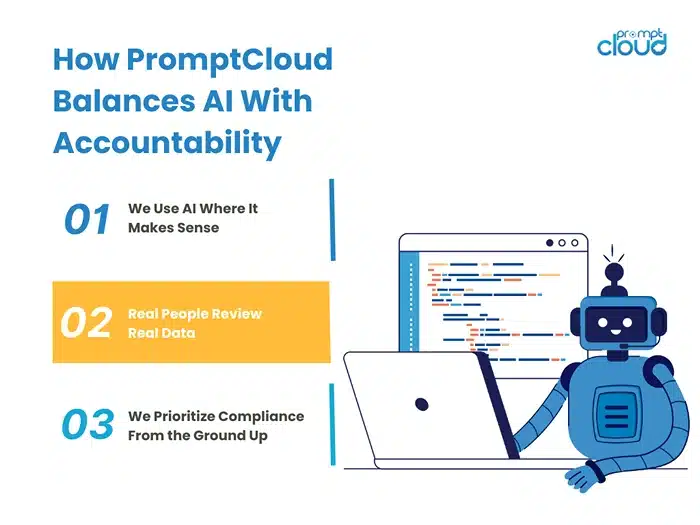
AI has its place in web scraping, but only when it’s used with care. At PromptCloud, we don’t believe in letting algorithms run wild. We’ve seen too many businesses come to us after being burned by scraping tools that promised automation but delivered chaos. The truth is, AI scraping needs a framework, and we’ve built one that works.
We Use AI Where It Makes Sense
AI can be powerful when you give it the right job. For example, it helps us identify changes in site layouts faster, recognize patterns across different domains, and flag outliers in large data sets that humans might miss. But we don’t rely on AI to make judgment calls, it’s not equipped for—like deciding which content is actually useful or legal to extract.
This balance between automation and caution is what sets a true web scraping service provider apart from a generic tool.
When AI is used thoughtfully, it’s an accelerator. When it’s used recklessly, it becomes a liability.
Real People Review Real Data
Every data stream that goes through our platform is checked. Not just for formatting, but for quality, relevance, and legal safety. If something looks wrong, it doesn’t get pushed to the client. That layer of human validation is the part most AI scraping tools skip—and it’s often where things break down.
Let’s say your target site changes its structure. An AI tool might scrape nothing, or worse, scrape the wrong thing without telling you. With our approach, we spot these issues early and fix them fast. You don’t lose days or weeks to broken pipelines.
We Prioritize Compliance From the Ground Up
Our infrastructure is built to comply with global regulations and site-level restrictions. From using location-appropriate IP pools to respecting crawl delays and robots.txt rules, we take compliance seriously because we know what’s at stake.
When you’re dealing with AI web scraping, things can get blurry. Sites update their terms. Laws shift. What was okay last month might not be okay today. We stay on top of that so you don’t have to.
It’s not just about data collection, it’s about responsible data collection. That’s what makes our service reliable and why so many clients stick with us long-term.
Smarter Data Starts With Smarter Decisions
AI scraping isn’t going anywhere. The speed and scale it offers are real. But speed without direction? That’s just spinning wheels.
What we’re seeing today is a wake-up call. Businesses that rushed into AI scraping are starting to realize it’s not as simple—or as safe—as it first seemed. Some are dealing with dirty data. Others are facing bans or legal headaches. A few don’t even know they’ve got a problem yet.
And that’s the point.
AI scraping needs guardrails. It needs context, oversight, and a team that knows how to handle edge cases before they become disasters. You don’t just need a tool—you need a partner. One who understands your industry, respects platform rules, and knows how to get the data without breaking the rules along the way.
That’s where PromptCloud comes in. We’re not just another scraper. We’re a web scraping service provider that believes in doing things right, from the first crawl to the final dataset. We use AI, yes—but always in ways that make your data more accurate, more usable, and more aligned with your goals.
So before you plug in another scraping tool and hope for the best, ask yourself: Is the risk really worth it?
If what you need is clean, reliable data, delivered the right way, we’re here to help. Contact us today!
FAQs
1. How does AI scraping differ from traditional web scraping methods?
Think of AI scraping like giving a bot a brain, sort of. Traditional scraping works off strict rules: go here, grab that, repeat. AI scraping tries to “understand” patterns and learn as it goes. In theory, that’s smarter. But in practice, it often means the bot starts pulling weird stuff or misreading what matters. It’s like giving a new intern full control before training them. Sometimes they get it right. Sometimes… not so much.
2. Is using AI for web scraping legally compliant across all websites?
It depends on what you’re scraping, where you’re scraping from, and how you’re doing it. Some sites are wide open and welcome scraping, others have hard “no”s written into their terms. AI web scraping tools usually don’t bother to check. And that’s where things get messy. One wrong move and you could be facing takedown notices or even legal heat. That’s why working with a legit web scraping service provider makes a difference. They check first and act second.
3. What are the practical risks of deploying AI scraping tools without oversight?
Honestly? You could get the wrong data, miss the good stuff, or even pull fake info that never existed. And if the site you’re scraping blocks you—or worse, reports your IP—you might lose access altogether. AI scraping is tempting because it’s fast, but without a safety net, it’s like driving with your eyes half-closed. It works until it really doesn’t.
4. How can businesses prevent inaccurate or fabricated data when using AI scraping?
Rule number one: Never trust an AI tool blindly. They don’t know what’s real unless someone teaches them, and most off-the-shelf tools don’t get much training. You need filters, rules, and a real human keeping an eye on things. That’s where services like PromptCloud come in. We clean the data, check for accuracy, and toss out the junk before it hits your feed. So, you get clean stuff, not guesswork.
5. Why should a company partner with a web scraping service provider instead of using in-house AI tools?
Cheap gets expensive when things go wrong. With a managed provider, you’re not just paying for data—you’re paying for stability, legality, quality, and real support. When a site changes or your needs shift, we adjust. When something breaks, we fix it. And when you scale, we scale with you. AI scraping tools? They don’t pick up the phone when your pipeline fails at 2 a.m.









